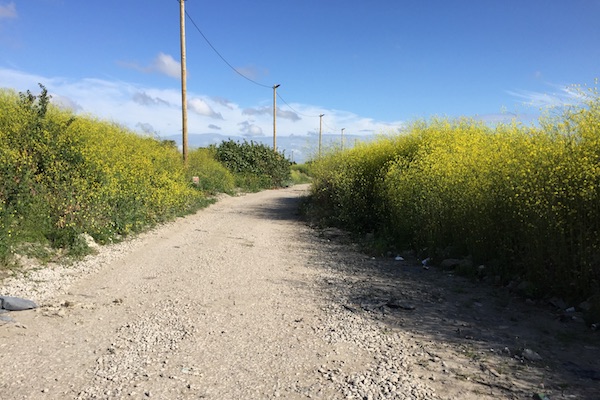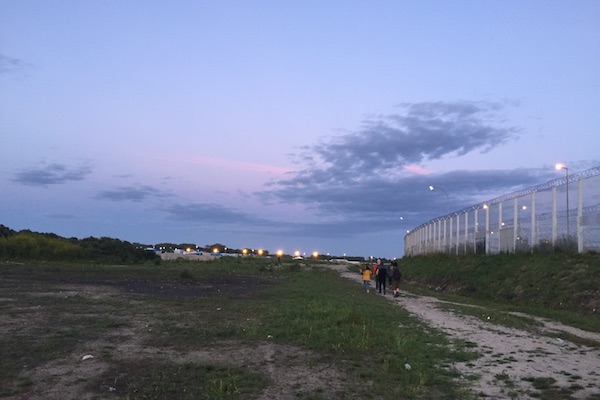My first day at Jungle Books in the Calais Jungle went smoothly and I met some nice people…until the very end. On my way to a classroom, I passed a young man around 20 years old from Kabul, who muttered something unintelligible, yet clearly hostile, under his breath. His friend urged him to be quiet while I ignored them both.
- My Observations of the Calais Jungle
- Calais Diaries: Day 1 at the Help Refugees Warehouse
- Lost in the Calais Jungle
- Calais Diaries: Saucepans, Jungle Books and a Conversation with a Weirdo
- Banksy’s Mural and the American Living in the Calais Jungle
- Calais Diaries: New Kabul Restaurant, The Kid, The Welcome Wagon, and A Momento
I walked into the classroom, where a British woman from Jungle Books taught English. A small group of students, led by a volunteer, were huddled in a corner, learning French. I watched for a while, until a young Somalian guy asked me in good English which language I spoke. “English, Pashto, Dari, and German.”
He wanted to know what “Wah Alika” meant, which he’d heard the Afghans in the camp say a lot to each other. I told him it was the equivalent of “Hey man!” Most of the Afghans in Calais spoke Pashto, so he wanted to know if I could teach him a few phrases so he could communicate with them.
As I was explaining a few phrases to him, the hostile Afghan guy from outside walked in, chip on his shoulder. He turned to me angrily and said in Dari, “You’re a traitor. Why are you teaching Pashto words to an African? He’s going to taunt Afghans with those words. And why are you in here helping him instead of your own people?”
I was taken aback by this truly idiotic line of questioning. Nevertheless, I told him that 1.) It’s not taunting unless you let it bother you and as a man you really shouldn’t. 2.) All people are the same to me and I’m not going to ignore someone because of their ethnicity. 3.) I was just outside for over an hour, helping my fellow Afghans.
He went on a rant for nearly an hour as I listened and tried to reason with him. He was angry about my presence in the camp and said I shouldn’t be there. On one hand, he said I wasn’t being helpful. When I asked what I could do, he said “nothing.” If I wanted to help my people, I should go to Afghanistan. It was absurd.
He even began disparaging me for growing up “abroad” and abandoning my homeland. And told me I shouldn’t tell people I was Afghan since I had grown up in the U.S.
I pointed out that I was 2 years-old when my parents took me out of Afghanistan. He, on the other hand, was an adult who made a decision to leave on his own. What was his excuse for abandoning his country?
Then he began mansplaining Afghanistan’s history, praising Northern Alliance war criminals, and disparaging ethnic Pashtuns. Finally, I stopped his tirade because it was going nowhere. I told him I was Pashtun and did not appreciate his racist remarks. I also gave him a history lesson and corrected some of the assertions he made about who exactly was responsible for the country being in turmoil today.
He appeared to be very concerned with culture, so I told him insulting people – especially a visitor – is incompatible with Afghan cultural norms. I explained to him that while I may have grown up abroad, that came with its own challenges. That while I was incredibly lucky not to have experienced war first hand, growing up in the U.S. wasn’t easy in a post-911 world.
It didn’t compare to his struggles, but living in a country that is at times hostile towards you isn’t exactly a cakewalk and he should be prepared for that as well.

When I was done, he apologized. He had assumed I was one of those clueless people who grew up abroad and didn’t know or care about their homeland’s culture, history, or current plight. After hearing me out, he realized he’d misjudged me. He called me his sister and said, “If you needed blood, I would cut my vein for you.”
He seemed genuinely remorseful and I felt bad for him, realizing it wasn’t an even playing field. We came from two different worlds and my kumbaya philosophy was a luxury out of his grasp.
Initially, I had taken his line of insults very personally, to a point where it actually hurt my feelings. This conversation reaffirmed my old mantra: When someone insults you, it says more about them than you. He was taking his frustrations out on me, ranting because he needed someone to hear him. Even though he was wrong and it bothered me at first, I understood where it came from.
He conveyed the difficulties of living in such a stressful environment; the constant pressure to make it to the UK, the abuse at the hands of the CRS officers, and the difficulty of depending on others for the most basic things. He also felt patronized by the volunteers at times, some of whom bounced in and out of the camp “for their own fun.” The stress of life in the Calais Jungle was getting to him and occasionally he experienced tremors.
It all began during his journey from Turkey, which was particularly harrowing. After watching several people drown on the boat ride to Greece, he met a woman traveling alone with two young daughters. They didn’t have a male figure protecting them, so he watched out for them, concerned about their safety.
At one point, he checked on the woman, who informed him one of the smugglers had threatened her and demanded that her older daughter walk with him for the rest of the journey. The woman felt helpless to refuse him.
He tracked down the smuggler, took the girl out of his grip, and warned him never to look in her direction or speak to her mother again. I recognized that despite his negativity and anger, he still had what Afghans refer to as “ghairat” – a sense of honor. And I knew that while his delivery was wrong, he came from a place of concern; of wanting to protect the Afghan girl who traveled from the U.S., alone, to a Jungle filled with strange men.
If nothing else, this conversation highlighted the importance of understanding and of communicating with people rather than judging them. If I had gone into snark mode (like I was tempted to do), belittled his position, or insulted him, it would have gotten worse.
By putting my emotions aside, explaining myself, then hearing him out, it put out the fire. He, in turn, understood me better and felt compelled to apologize. That doesn’t happen when you fight fire with fire.
That interaction really opened my eyes to some of the problems that arise in my own community due to poor communication. It changed the way I handle conflicts and deal with people in general. More importantly, it reminded me to be more understanding and less defensive when personally attacked.
It was getting late and the classroom had emptied about 20 minutes before. I had stepped outside – a gesture that I think made him respect me more because I was abiding by cultural norms that dictate men and women not be in a room alone together.
Looking around, I noticed the outdoor tables had cleared and I was worried the group had left without me. He felt bad and offered to walk me to the edge of the camp and call a taxi. I accepted his apology and decided to see if I could find my group.
I went into the classroom next to the library and was relieved when I found Max and the girls inside, working with a group of students. A young man from Peshawar asked what I was talking to his friend about outside. I explained the situation lightheartedly.
He had overheard some of it and wanted to apologize for his friend’s behavior. He reiterated that his friend was struggling with his mental health and often got into altercations as a result. I don’t know how many people witnessed our exchange, but for the next few days, several others approached me to apologize on behalf of their friend.

We left the camp and decided to walk to the beach to watch the sunset. It was close to 9 PM and the sun still hadn’t set in Calais. We walked along the edge of the camp until we were stopped by several CRS officers. Isabelle explained to them that we were going to the beach. After conferring with someone on the radio, they told us that wasn’t possible. The area was blocked.
As I walked past the young Afghan men playing cricket on the concrete path, I felt guilt. We were born in the same country. Yet through sheer luck I ended up in one of wealthiest countries in the world while they risked their lives for the same thing. At the end of the night, while these guys slept in the cold, I got to go back to my 2-star hotel and sleep on a mattress with clean sheets. Never did I understand the magnitude of that luxury more than when I walked past the row of tents in the Calais Jungle that night.
[jetpack_subscription_form title=”Subscribe via email for more points, miles and free travel”]
It’s been said becoming a US citizen in the last 50 years is equivalent to hitting the lottery in one’s country of origin. My ancestors chose to come 110 years ago, and I am overwhelmed with gratitude they made that decision.
It absolutely is – heck, just getting a green card is the jackpot. There are certainly other countries in the world that compete with the U.S. in terms of quality of life, but this remains the Shining City on the Hill that represents hope to so many people. I’ll never again take that for granted.
Hi Ariana, I have read your Calais jungle blog with great interest. Hopefully others will read what you have written and appreciate how lucky we are to live in the greatest country in the world – a country where freedom prevails and you can speak your mind without being afraid. Its this upbringing which has made you a strong girl. Kudos to you for doing what your heart tells you to do.
Feroz
Thank you Feroz!
Thank you for sharing this experience. I think it’s great you took the time to try to understand why he was upset.
Thanks Ramzi. I think we need more of that in the world – taking the time to understand each other, even if we don’t end up agreeing.
I think you need to take into account that many people in Calais are probably with PTSD or some mental issues, due to their experiences or fear or negative experiences, or simply desperation. While being rude is still being rude, and you should react to it, don’t take it personally, Ariana
I understand that. Still, in that moment it took me off guard and even though I knew better, it still oddly hurt my feelings. That being said, I was happy with the outcome. We talked it out, he apologized, and both of us walked away with a better understanding of each other.